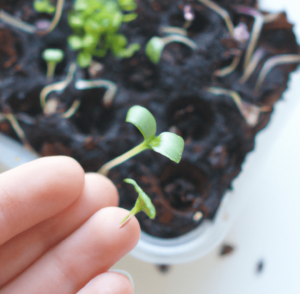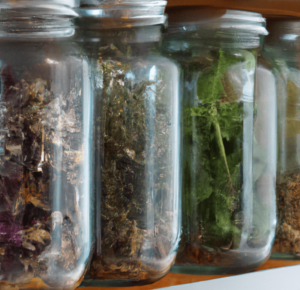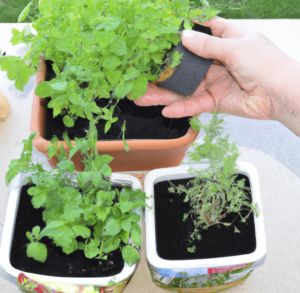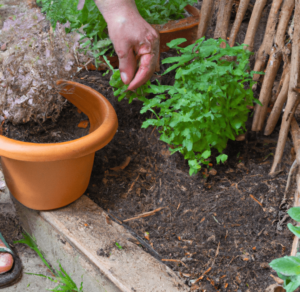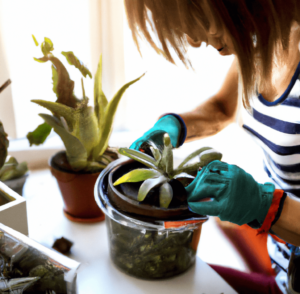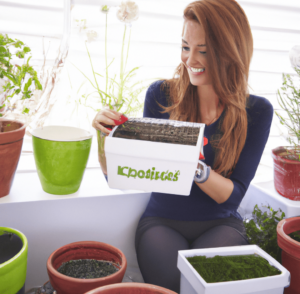Herbs are a wonderful asset to any home garden because they give your food scrumptious flavors and scents as well as all-natural cures for common illnesses. You learn all about planting herbs for beginners and simply grow your own herbs at home if you have a little soil, some sunlight, and some seeds. Growing your own herbs is a fun and satisfying way to bring a little bit of nature into your house, regardless of whether you’re a gardening pro or a newbie.
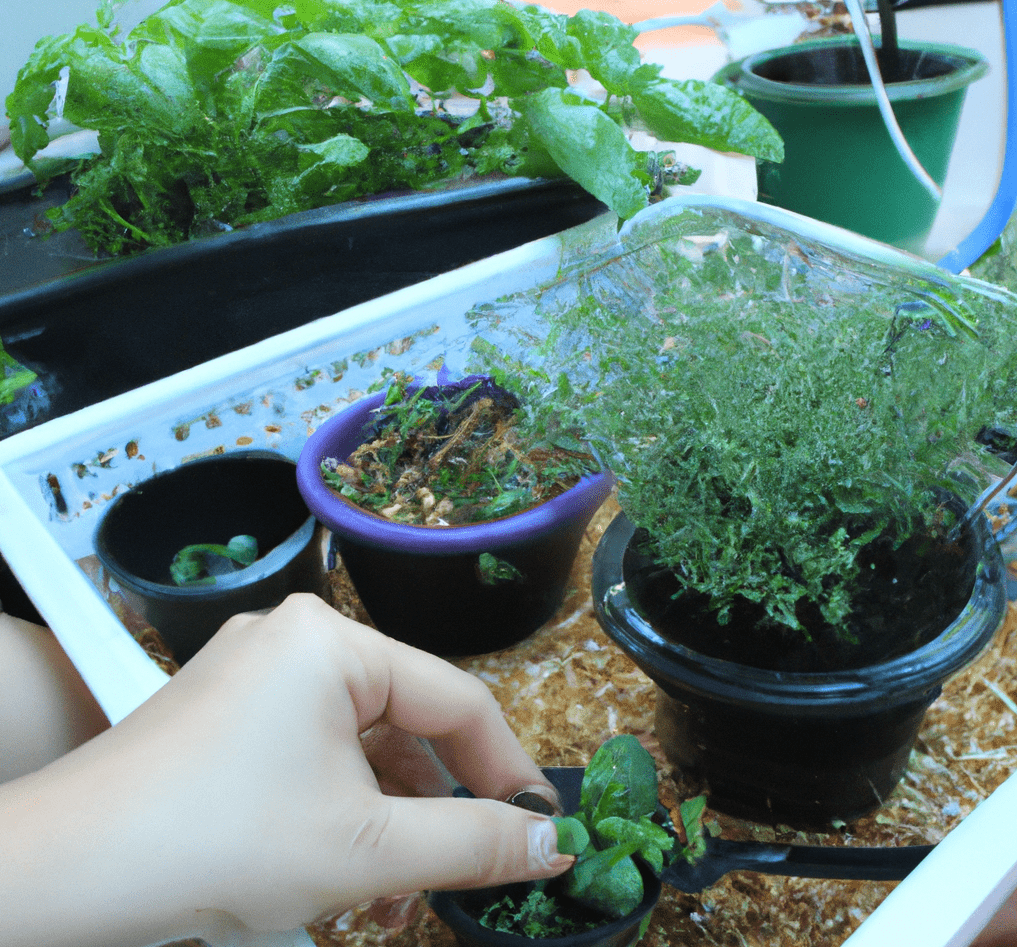
Planning and Preparation
Planning and preparation are requirements for planting herbs for beginners.
Choosing the Right Location for Your Herb Garden
Consider the particular requirements of each plant when deciding where to place your herb garden:
- Some herbs, like oregano and thyme, are appropriate for planting outside since they can withstand dry soil and full light. Other herbs, like mint and basil, may be better suited for indoor growth because they prefer moist soil and some shade.
- If you’re planting outside, pick a location that gets at least six hours of sunlight each day. An area near a sunny window or on a sunny windowsill is great for indoor gardening.
- Remember that throughout the year, especially in the spring and fall when the sun is at a different angle, your plants will receive varying amounts of light.
- To avoid root rot while planting inside, pick pots with sufficient drainage holes. The container’s size needs to match the size of the herb’s root system.
- If you’re planting outside, pick a spot with soil that drains well and is free of weeds. To enable healthy root development, loosen the soil to a depth of 12 to 15 inches.
- When choosing the ideal spot for planting, take into account the herb’s size, the space it will require to grow, as well as its particular soil and light requirements.
Make sure the area you pick will provide your plants with the proper quantity of light for their unique requirements.
Preparing the Soil
The secret to planting herbs for beginners is prepared soil. If you’re following an outdoor gardening guide:
- Get rid of any weeds and dig down 12 to 15 inches to soften the soil.
- Compost or other organic matter can be added to the soil to increase drainage and fertility, if necessary.
- Use a well-draining potting mix created specifically for herbs or other container-grown plants for planting indoors.
- Garden soil should not be used as it may not provide adequate drainage and may compact in a container.
Whether you are planting outdoors or indoors, it is crucial to select soil that is suitable for the unique requirements of the herbs you are cultivating.
Planting Herbs for Beginners and Care
The final steps in planting herbs for beginners are planting and maintenance:
- Plant seeds as directed on the seed packaging or transplant seedlings or established plants into your containers or patch of land to get started.
- After planting, give your herbs a good soak, and then water them again as needed, being cautious not to overwater.
- Make sure your herbs get the right amount of sunlight and shelter them from windy conditions.
- As you learn about planting herbs for beginners, begin with a small number of simple-to-grow herbs and then add more as you acquire experience.
How to Plant and Care for Specific Herbs Such As Basil, Mint, Cilantro, and Parsley
Basil, mint, cilantro, and parsley are the usual choices in planting herbs for beginners. There are a few crucial measures that must be taken in order to successfully grow these herbs.
- Basil: Basil enjoys full sun to partial shade and well-draining soil. Water your basil plants regularly, being cautious not to overwater, and space them approximately 12 to 18 inches apart. Basil plants should have their tips routinely pinched off to promote bushier growth.
- Mint: This is a herb with a quick growth rate that prefers moist soil and some shade. Mint may spread quickly in a garden, so plant it in a container. Maintain moist soil and regularly pinch the mint plants’ tops to promote bushier growth.
- Cilantro: A cool-season herb, cilantro prefers full sun to moderate shade and well-draining soil. Water your cilantro plants regularly, being cautious not to overwater them, and space them approximately 6 to 12 inches apart. To promote bushier growth, pinch the cilantro plants’ tips frequently.
- Parsley: Parsley enjoys full sun to light shade and well-draining soil. Water your parsley plants frequently, being cautious not to overwater them, and space them approximately 12 to 18 inches apart. Regularly pinch off the parsley plants’ tips to promote bushier growth.
Tips for Watering, Fertilizing, and Pruning
In order to maintain the health and success of your herbs, it’s crucial to water, fertilize, and prune them. Our planting herbs for beginners tips on this include:
- Watering: Depending on the type of herb, the soil, and the weather, different plants require different amounts and frequencies of watering. Generally speaking, it is better to water herbs sparingly and deeply than frequently and shallowly. Don’t overwater plants because this can cause root rot.
- Fertilizing: Herbs cultivated for their leaves, such as parsley, and basil, will profit from a consistent supply of nutrients. Use a balanced, water-soluble fertilizer and apply it as directed by the manufacturer. Compost and other organic materials can also be used to improve the soil.
- Pruning: Pruning can help you manage the size and form of your herbs while promoting healthy growth. In order to promote bushier growth, it is often advisable to pinch off the herb’s tips on a regular basis. In order to encourage healthy development, you can trim perennial herbs like oregano and mint back by one-third to one-half in the spring.
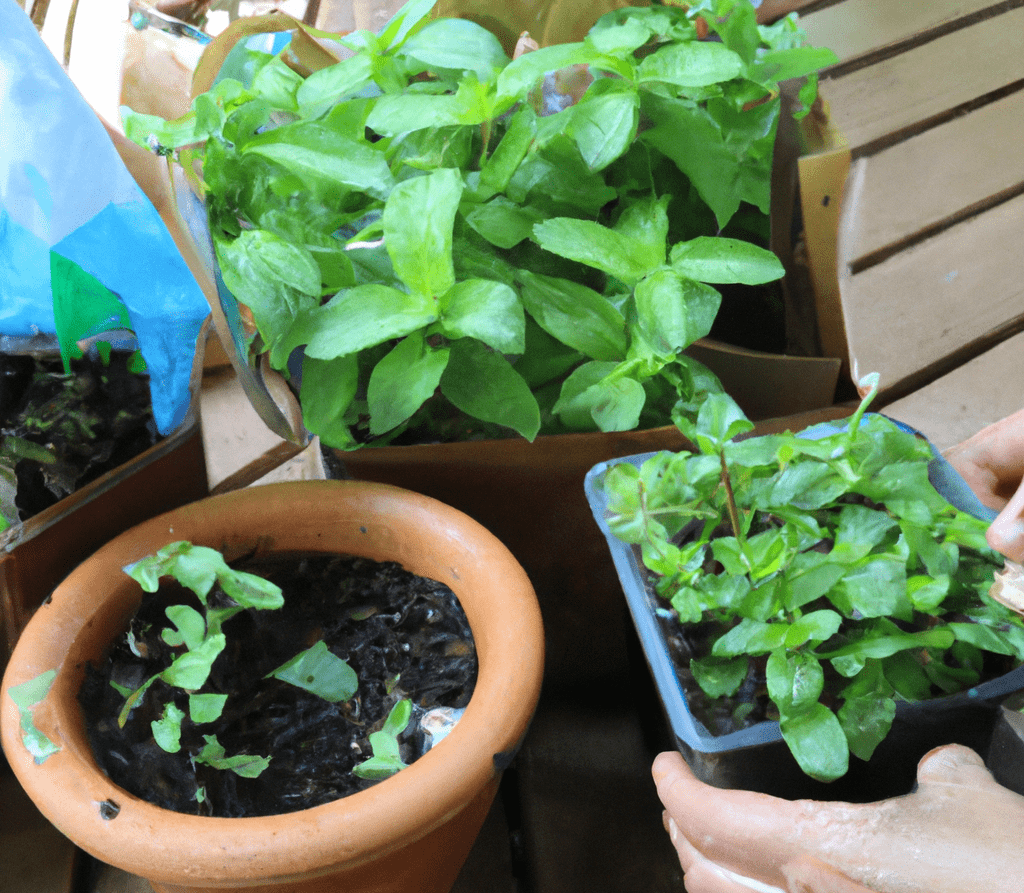
Harvesting and Using Herbs
It’s time to harvest and take pleasure in the results of your labor after all your hard work planting, tending, fertilizing, and pruning your herbs! Our tips for planting herbs for beginners and harvesting them for use include:
- It is ideal to gather herbs early in the day when the dew has dried and before it gets too hot.
- Always leave the plant with a sufficient number of leaves to ensure its health while being careful not to harm the soil or roots.
- Herbs can be utilized in many different ways, such as fresh in salads and recipes, preserved for later use, or used to produce tinctures and teas.
- You may get the freshest, tastiest herbs right from your own kitchen garden by planting your own.
- Your herb garden will keep giving you fresh herbs for years to come if you give it the necessary care and attention.
Tips for When and How to Harvest Herbs for Optimal Flavor and Nutritional Value
Just before they flower, herbs are at their tastiest and most nutritious, so it’s critical to time your harvests properly. While you’ve learned about planting herbs for beginners, make sure to:
- Harvest in the morning: Early in the day, herbs contain the highest concentration of essential oils, which give them their flavor and perfume. Before picking the herbs, give them some time to dry out and the sun to warm them.
- Leave enough leaves on the plant to ensure that it continues to develop and thrive. Avoid over-harvesting. If you need to remove a large number of leaves, spread them out across multiple harvests rather than doing them all at once.
- Prior to blooming, harvest: It is ideal to pick the leaves before they start to flower since once the plant starts to produce flowers, the essential oils in the leaves start to decrease. Harvest some herbs before they flower, such as basil and cilantro, as they become bitter once they flower.
- Use the appropriate tools: To pick your herbs without hurting the plant or leaving behind any undesirable material, use clean, sharp instruments.
Ideas for Using Fresh Herbs in Cooking and Other Household Uses
You can use an abundance of fresh products from your herb garden in your kitchen and other parts of the house:
- Fresh herbs give any food taste and scent. Chop them up and use them in sauces, marinades, dressings, stews, and soups. Try adding mint to your preferred fruit salad or using basil in a Caprese salad.
- Fresh herbs and oil or vinegar can be used to make delightful infused oils and kinds of vinegar.
- Fresh or dried herbs can be steeped in hot water to make a tasty and nutritious tea.
- To smell your clothing drawers or use them as a natural air freshener, fill tiny cloth bags with a combination of dried herbs.
- Lavender and chives are two herbs that might help keep pests away from your home and yard.
You may take advantage of the advantages of your homegrown plants in novel and fascinating ways by using fresh herbs in your daily cooking and domestic routine. When you’re learning about planting herbs for beginners, the possibilities are endless whether you’re growing basil, mint, cilantro, or parsley!
Bottom Line: Planting Herbs for Beginners
In conclusion, planting herbs for beginners can be done just as easily as growing flowers for beginners with the right information and tools. There are many things to think about while beginning your herb garden, from picking the ideal location to choosing the proper containers or plot of land, preparing the soil, planting, and caring for your herbs. However, you can produce a ton of fresh herbs in your own house with a little amount of forethought, care, and planning.
Herbs are adaptable plants that can be cultivated in the ground or in containers, indoors or out. They are often low maintenance and simple to maintain, although they do need sunlight, well-drained soil, and enough water.
However, growing herbs is a terrific way to add fresh, flavorful items to your cooking and daily routine, regardless of how experienced a gardener you are, so give it a shot!
Planting Herbs for Beginners FAQs
Why should I plant herbs in my own yard?
Herbs are a great addition to any home garden since they enhance the flavor and aroma of your meals and act as all-natural cures for common sicknesses. You can learn all about planting herbs for beginners above before moving on to other types of gardening (e.g., container gardening for beginners).
What factors should I take into account when designing my herb garden?
Take into account the herbs you want to grow and the locations where you want to place them (e.g., in a designated garden area or on your kitchen windowsill). For your herbs to flourish, make sure the growing area has access to sunlight and the proper kind of soil.
What kind of planting space or containers should I use?
Use containers with sufficient drainage holes when growing inside to prevent root rot. The size of the container should correspond to the size of the herb’s root system. If planting outdoors, pick a location with weed-free, well-draining soil, then soften the soil to a depth of 12 to 15 inches to promote strong root growth. When choosing a container or plot of land, take into account the size, growing space, soil requirements, and light requirements of each herb.
How can I get the soil ready for planting?
The key to successful herb growing is prepared soil. If planting outdoors, get rid of any weeds and soften the soil 12 to 15 inches deep. If necessary, improve the soil’s fertility and drainage by adding compost or other organic material. Use a well-draining potting mix designed especially for herbs or container-grown plants for planting indoors. Select a soil that is appropriate for the special needs of the herbs you are cultivating.
What are the steps for growing and taking care of my herbs?
In your containers or on your plot of land, sow seeds or transplant seedlings or established plants. After planting, give your herbs a good drink, and then as needed. Avoid overwatering. Make sure your herbs get the proper amount of sunlight and shelter them from stormy weather. It is advised for beginning herb gardeners to begin with a few easy-to-grow herbs and progressively add more as they acquire experience.


